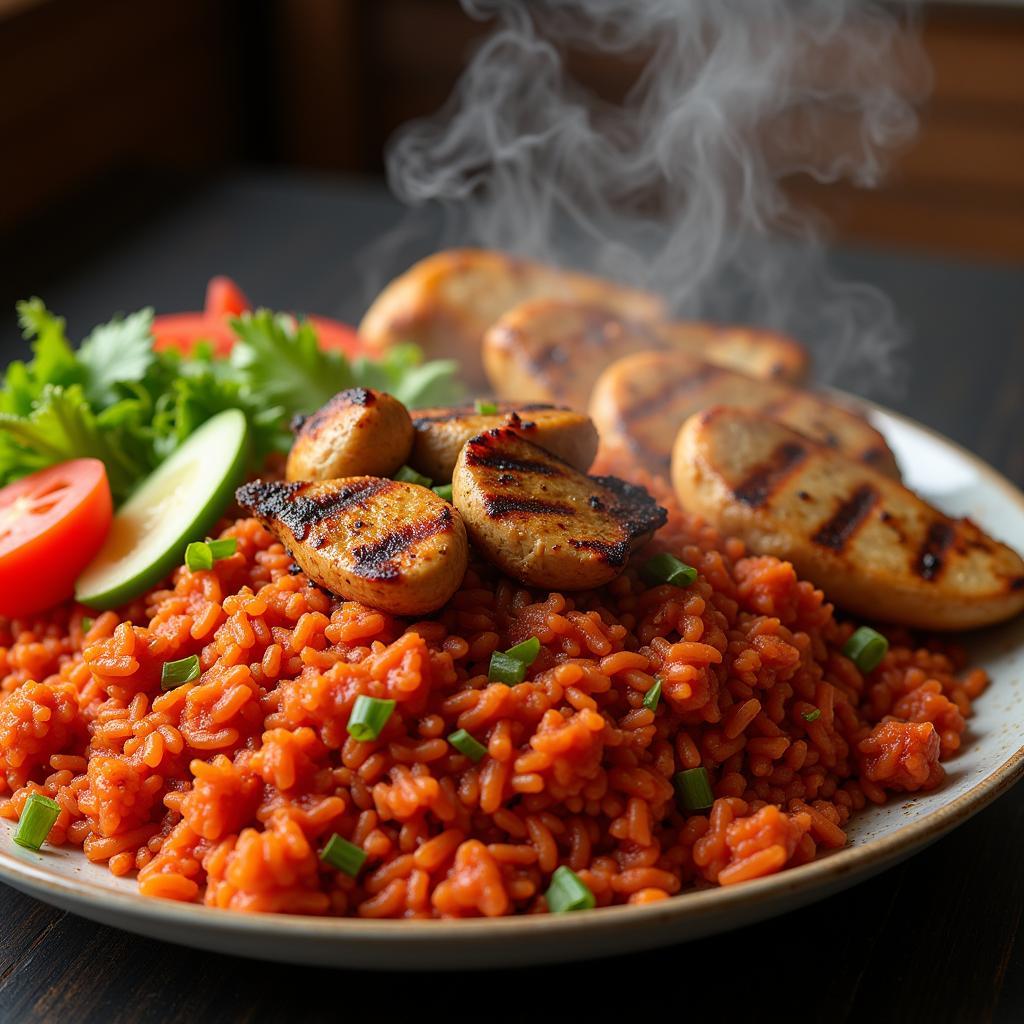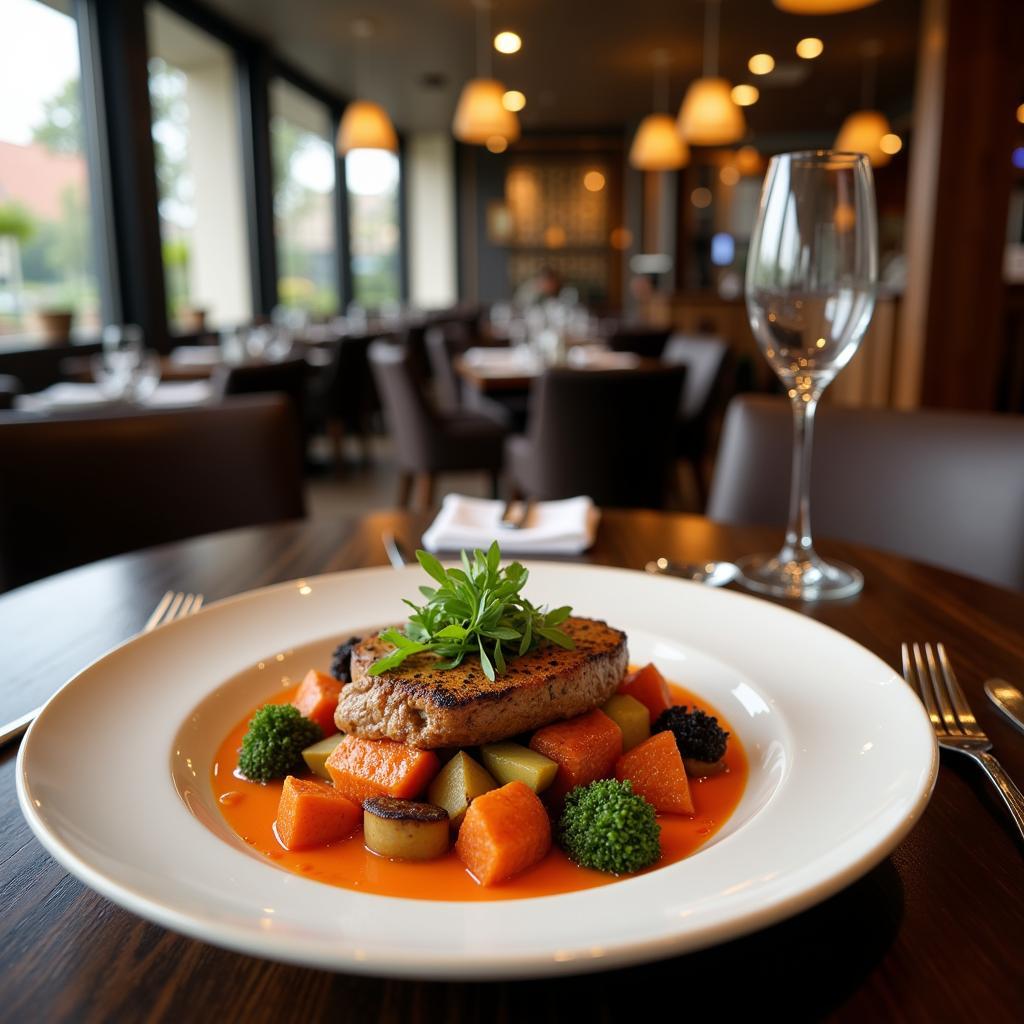Exploring the Diverse World of African Cuisine Food
African Cuisine Food is more than just a meal; it’s a vibrant tapestry woven from the continent’s rich history, diverse cultures, and abundant resources. From the fragrant tagines of Morocco to the spicy jollof rice of West Africa, each dish tells a story and offers a unique culinary experience. This exploration delves into the heart of African food, uncovering its hidden gems and celebrating its global influence. african hands catch the food
The Regional Variations of African Cuisine Food
African cuisine food is incredibly diverse, varying significantly from region to region. North African cuisine, influenced by Mediterranean and Arabic flavors, features dishes like couscous, tagines, and flavorful pastries. West African cuisine is known for its hearty stews, vibrant spices, and the ubiquitous jollof rice. East African cuisine showcases the use of fresh produce, grilled meats, and influences from Indian and Arab cultures. Southern African cuisine is characterized by its braais (barbecues), rich stews, and the use of indigenous ingredients. Central African cuisine often utilizes cassava, plantains, and peanuts, creating unique and flavorful dishes.
 West African Jollof Rice
West African Jollof Rice
Key Ingredients in African Cuisine Food
Certain ingredients play a crucial role across many African cuisines. Starchy staples like millet, sorghum, and cassava form the base of many meals. Legumes, including beans, peas, and lentils, provide essential protein. A wide array of spices and herbs, such as ginger, cumin, and coriander, add depth and complexity to dishes. Palm oil, shea butter, and groundnut paste are also commonly used, adding richness and unique flavors.
What are some popular African dishes?
Some popular African dishes include Jollof rice, a flavorful rice dish cooked with tomatoes, onions, and peppers; Tagine, a slow-cooked stew prepared in a distinctive earthenware pot; Piri-piri chicken, marinated in a spicy chili sauce; and Bobotie, a South African dish consisting of spiced minced meat topped with a creamy egg custard.
The Cultural Significance of African Cuisine Food
Food in Africa is not just sustenance; it’s deeply intertwined with cultural traditions and social gatherings. Meals are often shared communally, strengthening bonds between family and friends. Specific dishes are prepared for celebrations and ceremonies, symbolizing unity and tradition. The preparation and sharing of food are essential aspects of African hospitality, reflecting the continent’s warm and welcoming spirit.
African Cuisine Food in the Global Culinary Landscape
African cuisine is gaining increasing recognition on the global culinary stage. Its vibrant flavors, unique ingredients, and cultural significance are attracting attention from chefs and food enthusiasts worldwide. african food style cuisine urm kenki images More restaurants specializing in African cuisine are opening up, offering diners a chance to experience the continent’s diverse culinary offerings. African food bloggers and chefs are also playing a vital role in sharing their knowledge and passion for African food with a wider audience.
How can I learn more about African cuisine food?
Explore online resources like african food chart and african breakfast foods to discover the diverse dishes and ingredients used across the continent. You can also find various cookbooks and online recipes to try preparing African dishes at home.
“African food is an adventure for the palate,” says Chef Abiola Akande, a renowned Nigerian chef. “Its complexity and diversity are unmatched, and every bite tells a story of history and tradition.”
 African Cuisine in a Modern Restaurant Setting
African Cuisine in a Modern Restaurant Setting
Conclusion
African cuisine food is a vibrant and diverse culinary tradition that deserves global recognition. From its unique ingredients and flavorful dishes to its cultural significance and growing global influence, African food offers a rich and rewarding culinary journey. african food network Exploring African cuisine is not just about tasting new flavors; it’s about connecting with the heart and soul of a continent.
FAQ
- What is the most popular dish in Africa? While popularity varies by region, jollof rice is a strong contender for the title of most popular dish in Africa, particularly in West Africa.
- Is African food spicy? The level of spice in African food varies depending on the region and dish. While some dishes are known for their fiery heat, many others offer milder flavors.
- What are some common African spices? Common African spices include ginger, cumin, coriander, paprika, and chili peppers.
- Where can I find African restaurants? African restaurants are becoming increasingly common in major cities around the world. Online directories and review sites can help you find African restaurants near you.
- What are some good African cookbooks for beginners? There are numerous excellent African cookbooks for beginners, many of which focus on specific regions or cuisines. Look for cookbooks with clear instructions and readily available ingredients.
- Are there vegetarian options in African cuisine? Yes, many African dishes are naturally vegetarian or can be easily adapted. Legumes, vegetables, and grains are staples in many African cuisines.
- What are some traditional African beverages? Traditional African beverages include palm wine, hibiscus tea, and ginger beer.
Scenarios
- Scenario 1: You are planning a dinner party and want to introduce your guests to African cuisine. Start with a flavorful appetizer like plantains or samosas, followed by a main course of jollof rice or tagine. Finish with a refreshing dessert like mango sorbet.
- Scenario 2: You are traveling to Africa and want to experience the local cuisine. Be adventurous and try different dishes from street vendors and local restaurants. Don’t be afraid to ask questions and learn about the ingredients and cooking methods.
- Scenario 3: You are interested in learning more about African culture through food. Research online, read cookbooks, and watch documentaries about African cuisine. Consider taking a cooking class or attending a food festival to experience the flavors and traditions firsthand.
Further Exploration
Explore related topics like the history of African cuisine, the role of women in African food culture, and the impact of climate change on food security in Africa. Discover more about specific regional cuisines and delve into the unique culinary traditions of different African countries.
If you need assistance, please contact us at Phone: +255768904061, Email: [email protected] or visit our office at Mbarali DC Mawindi, Kangaga, Tanzania. We have a 24/7 customer support team.


